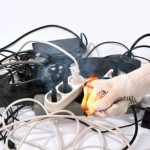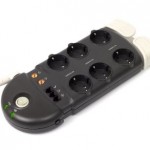Practice Electrical Safety in May (and Always!)
May is electrical safety month, but it’s imperative to perform regular safety checks around homes and businesses. Today, electrical safety laws help ensure that installation and repair of electrical components are done to strict standards, but that doesn’t mean homeowners can shrug off important electrical precautions. So read on to discover ways to stay safe around electricity all year long.
Common Safety Devices
There are two major common safety devices that should be in every home. The first is a GFCI outlet, which stands for Ground Fault Circuit Interrupter. Building laws state that these are required in rooms with access to water. So they’re typically found in bathrooms, garages, laundry rooms, and kitchens. This is because water can increase the risk of electrical shock. GFCI outlets work by measuring the current between the hot and neutral sides of the plug and shutting off if they sense an anomaly. In the event of an electrical shock, these outlets can save lives.
Another similar device is called an Arc Fault Circuit Breaker or Arc Fault Circuit Interrupter (AFCI). These work to prevent electrical fires by detecting when electricity jumps an air gap between conductors, efficiently shutting off the flow of electricity.
Signs the Electrical System Is Overloaded
 Although most homes should already have GFCIs and AFCIs, nothing beats a little knowledge about electrical safety. Safety devices can only do so much. The rest is up to the people who live in the home or work in the building. This is why it’s important to be familiar with the signs that an electrical system is overloaded.
Although most homes should already have GFCIs and AFCIs, nothing beats a little knowledge about electrical safety. Safety devices can only do so much. The rest is up to the people who live in the home or work in the building. This is why it’s important to be familiar with the signs that an electrical system is overloaded. The most common sign that there’s something wrong with an electrical system is constant breaker trips. When a breaker trips, cutting off power to a specific part of the house, it means that the safety mechanism in the breaker has detected a power overload. Until the homeowner can figure out what is causing the overload and address it, it’s a bad idea to simply flip the breaker back on. Other common signs include flickering or dimming lights, warm outlets, and any buzzing or popping sound coming from outlets, switches, or the breaker box.
Surge Protection Devices

Using surge protection devices in the home is also a good idea. These devices can protect appliances and help prevent electrical fires in some cases. Plugging appliances into a surge protector helps protect them from electrical surges, which could damage them.
Whole-home surge protectors are another option. These devices protect the home from external power surges like lightning strikes or downed power lines. Although not incredibly common, these types of accidents do happen. And when they do, they can cause thousands of dollars of damage. Without a whole-home surge protector, everything from ovens to televisions to copy machines can take the brunt of a power surge.
This is why electrical experts recommend that homeowners use surge protectors at each outlet and install one that protects the entire house. This added layer of protection can mean the difference between a full-fledged disaster and a minor inconvenience.
About Solaris Electric
Since 2008, Solaris Electric has been serving Orlando, FL, residents. They offer up-front pricing and superb workmanship. They are also proud to offer a 100% satisfaction guarantee for every job they do! Contact them to learn more about electrical safety services today!



























